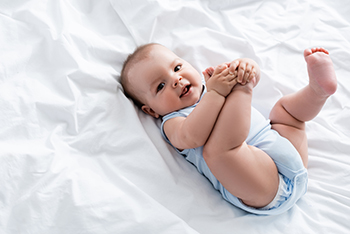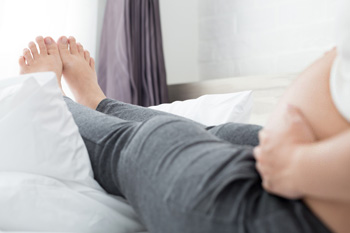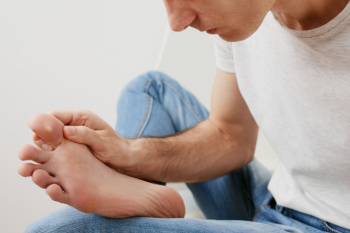Items filtered by date: December 2024
Ingrown Toenails in Babies

Ingrown toenails in babies occur when the edge of a toenail grows into the surrounding skin, causing redness, swelling, and sometimes discomfort. It most commonly affects the big toe and can result from tight socks, wearing ill-fitting shoes, or natural nail curvature. Unlike in adults, baby toenails are soft and pliable, so the condition often resolves with gentle care. Keep your baby’s feet clean and dry and avoid trimming nails too short or rounded. Instead, cut straight across to reduce the risk of the nail embedding into the skin. If the area becomes red, swollen, or shows signs of infection, such as pus or increased warmth, it is suggested that you seek care from a podiatrist who can provide safe and effective treatment, ensuring your baby’s comfort and preventing further complications.
Ingrown toenails can become painful if they are not treated properly. For more information about ingrown toenails, contact Dr. John Branwell of Kearny, New Jersey. Our doctor can provide the care you need to keep you pain-free and on your feet.
Ingrown Toenails
Ingrown toenails occur when a toenail grows sideways into the bed of the nail, causing pain, swelling, and possibly infection.
Causes
- Bacterial infections
- Improper nail cutting such as cutting it too short or not straight across
- Trauma to the toe, such as stubbing, which causes the nail to grow back irregularly
- Ill-fitting shoes that bunch the toes too close together
- Genetic predisposition
Prevention
Because ingrown toenails are not something found outside of shoe-wearing cultures, going barefoot as often as possible will decrease the likeliness of developing ingrown toenails. Wearing proper fitting shoes and using proper cutting techniques will also help decrease your risk of developing ingrown toenails.
Treatment
Ingrown toenails are a very treatable foot condition. In minor cases, soaking the affected area in salt or antibacterial soaps will not only help with the ingrown nail itself, but also help prevent any infections from occurring. In more severe cases, surgery is an option. In either case, speaking to your podiatrist about this condition will help you get a better understanding of specific treatment options that are right for you.
If you have any questions please feel free to contact our office located in Kearny, NJ . We offer the newest diagnostic and treatment technologies for all your foot and ankle needs.
Foot Issues During Pregnancy

Pregnancy can bring a range of foot conditions due to the body’s changing hormones, weight distribution, and circulation. Flat feet are common, as the increased weight can cause the arches to flatten, leading to foot pain and discomfort. Swelling, or edema, is another frequent issue, especially in the later stages of pregnancy, as the body retains more fluid, and the growing uterus puts pressure on veins in the legs and feet. Causes of pregnancy-related foot conditions include hormonal changes, extra weight, and changes in posture or gait. Swollen feet and flat arches can lead to pain, fatigue, and difficulty walking. Treatment often includes elevating the feet, wearing supportive shoes, using compression stockings, and performing foot exercises. A podiatrist can provide specialized care, such as custom orthotics for flat feet or advice on managing swelling. If you are experiencing foot pain or swelling during pregnancy, it is suggested that you schedule an appointment with a podiatrist.
Pregnant women with swollen feet can be treated with a variety of different methods that are readily available. For more information about other cures for swollen feet during pregnancy, consult with Dr. John Branwell from Kearny, New Jersey. Our doctor will attend to all of your foot and ankle needs.
What Foot Problems Can Arise During Pregnancy?
One problem that can occur is overpronation, which occurs when the arch of the foot flattens and tends to roll inward. This can cause pain and discomfort in your heels while you’re walking or even just standing up, trying to support your baby.
Another problem is edema, or swelling in the extremities. This often affects the feet during pregnancy but tends to occur in the later stages.
How Can I Keep My Feet Healthy During Pregnancy?
- Wearing orthotics can provide extra support for the feet and help distribute weight evenly
- Minimize the amount of time spent walking barefoot
- Wear shoes with good arch support
- Wear shoes that allow for good circulation to the feet
- Elevate feet if you experience swelling
- Massage your feet
- Get regular, light exercise, such as walking, to promote blood circulation to the feet
If you have any questions please feel free to contact our office located in Kearny, NJ . We offer the newest diagnostic and treatment technologies for all your foot and ankle needs.
Choosing the Right Long Distance Running Shoes

Choosing the right long distance running shoes is essential for comfort and injury prevention. Start by considering your arch type, which can be high, medium, or low. A proper shoe should support your specific arch to promote natural foot alignment. Foot pronation, or how your foot rolls inward while running, is another factor to consider. Overpronation or underpronation may require shoes with extra support or cushioning to correct the motion. Cushioning support is also important for long runs, as it absorbs shock and reduces strain on your joints. Pay attention to shoe size and fit to avoid discomfort. Your shoes should be snug but not too tight, with enough room in the toe box to prevent rubbing. Choosing shoes that suit your individual needs ensures a comfortable and injury-free running experience. If you enjoy this type of running and have endured a foot injury from wearing the wrong types of shoes, it is suggested that you contact a podiatrist who can offer you treatment solutions, in addition to guiding you on what type of shoes to buy.
You should always make sure your running shoes fit properly in order to avoid injury. For more information, contact Dr. John Branwell from Kearny, New Jersey. Our doctor can provide the care you need to keep you pain-free and on your feet.
Choosing the Right Running Shoe for Your Foot Type
Improper shoe sizing can cause a myriad of problems for your feet. Shoes that don’t fit you properly can lead to muscular imbalances in your body, which can result in foot, knee, and hip injuries.
Tips for Finding the Right Running Shoe
- Make sure you have a thumb’s width of wiggle room between the end of your longest toe and the front of the shoe.
- There should be little to no slipping at the heel
- Don’t assume your size in one shoe brand will be your size in another
- Do not lace up your shoes too tightly
- Walk around in the store with your new shoes before you buy them
If you have any questions please feel free to contact our our office located in Kearny, NJ . We offer the newest diagnostic and treatment technologies for all your foot and ankle needs.
Heel Pain Can Be Treated!
Painful Foot Cramps

Nighttime foot cramps can be a distressing experience, as they interrupt sleep and can cause significant pain. These involuntary muscle contractions often occur due to muscle fatigue, inadequate potassium intake, or low magnesium levels. Wearing poorly fitting shoes, particularly high heels that restrict blood flow or lack proper support, can also contribute to these painful episodes. Unlike restless leg syndrome, which creates an urge to move the legs, foot cramps involve sharp pain and tightening of the muscles. A podiatrist can identify the underlying cause of nocturnal foot cramps and recommend appropriate treatments, such as improving footwear choices, addressing muscle fatigue, or identifying potential deficiencies. They may also suggest a series of exercises designed to strengthen foot muscles or enhance flexibility to prevent future cramps. If you regularly experience painful foot cramps at night, it is suggested that you schedule an appointment with a podiatrist for a diagnosis and treatment options.
Foot Pain
Foot pain can be extremely painful and debilitating. If you have a foot pain, consult with Dr. John Branwell from Kearny, New Jersey. Our doctor will assess your condition and provide you with quality foot and ankle treatment.
Causes
Foot pain is a very broad condition that could be caused by one or more ailments. The most common include:
- Bunions
- Hammertoes
- Plantar Fasciitis
- Bone Spurs
- Corns
- Tarsal Tunnel Syndrome
- Ingrown Toenails
- Arthritis (such as Gout, Rheumatoid, and Osteoarthritis)
- Flat Feet
- Injury (from stress fractures, broken toe, foot, ankle, Achilles tendon ruptures, and sprains)
- And more
Diagnosis
To figure out the cause of foot pain, podiatrists utilize several different methods. This can range from simple visual inspections and sensation tests to X-rays and MRI scans. Prior medical history, family medical history, and any recent physical traumatic events will all be taken into consideration for a proper diagnosis.
Treatment
Treatment depends upon the cause of the foot pain. Whether it is resting, staying off the foot, or having surgery; podiatrists have a number of treatment options available for foot pain.
If you have any questions, please feel free to contact our office located in Kearny, NJ . We offer the newest diagnostic and treatment technologies for all your foot care needs.
Definition and Causes of Plantar Warts

Plantar warts are small, rough growths that develop on the soles of the feet, often causing discomfort or pain when walking. They are caused by the human papillomavirus, or HPV, which enters the skin through tiny cuts or abrasions. The virus thrives in warm, moist environments, making public areas like swimming pools, showers, and gym floors common places for transmission. Plantar warts typically appear as firm, raised bumps with a rough texture and may have small black dots in the center, which are blood vessels. The pressure from walking or standing often causes them to grow inward, making them more painful. Although plantar warts are generally not dangerous, they can be extremely painful. If you have developed a plantar wart, it is suggested that you consult a podiatrist who can offer effective relief and treatment solutions.
Plantar warts can be very uncomfortable. If you need your feet checked, contact Dr. John Branwell from Kearny, New Jersey. Our doctor will assist you with all of your foot and ankle needs.
About Plantar Warts
Plantar warts are the result of HPV, or human papillomavirus, getting into open wounds on the feet. They are mostly found on the heels or balls of the feet.
While plantar warts are generally harmless, those experiencing excessive pain or those suffering from diabetes or a compromised immune system require immediate medical care. Plantar warts are easily diagnosed, usually through scraping off a bit of rough skin or by getting a biopsy.
Symptoms
- Lesions on the bottom of your feet, usually rough and grainy
- Hard or thick callused spots
- Wart seeds, which are small clotted blood vessels that look like little black spots
- Pain, discomfort, or tenderness of your feet when walking or standing
Treatment
- Freezing
- Electric tool removal
- Laser Treatment
- Topical Creams (prescription only)
- Over-the-counter medications
To help prevent developing plantar warts, avoid walking barefoot over abrasive surfaces that can cause cuts or wounds for HPV to get into. Avoiding direct contact with other warts, as well as not picking or rubbing existing warts, can help prevent the further spread of plantar warts. However, if you think you have developed plantar warts, speak to your podiatrist. He or she can diagnose the warts on your feet and recommend the appropriate treatment options.
If you have any questions please feel free to contact our office located in Kearny, NJ . We offer the newest diagnostic and treatment technologies for all your foot and ankle needs.

